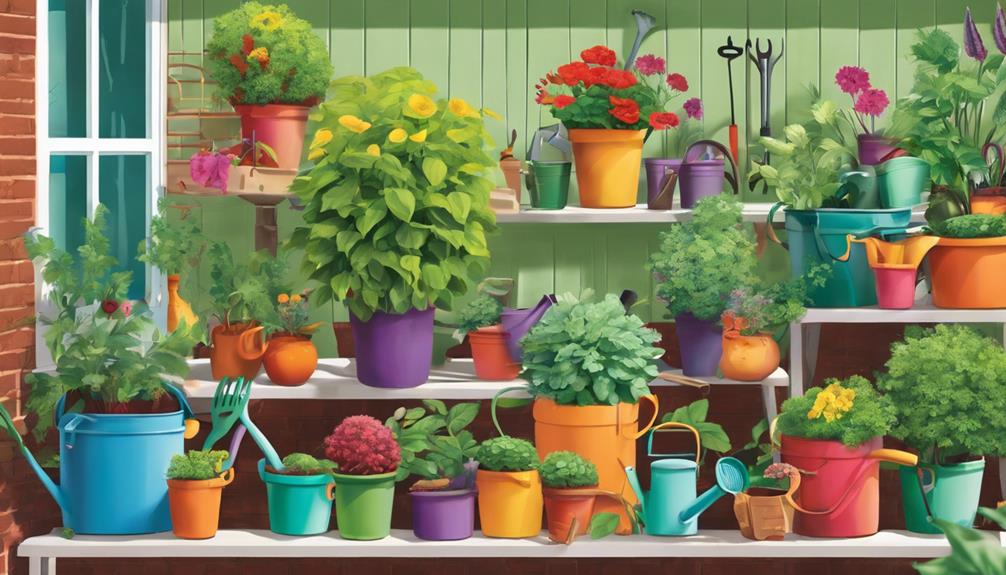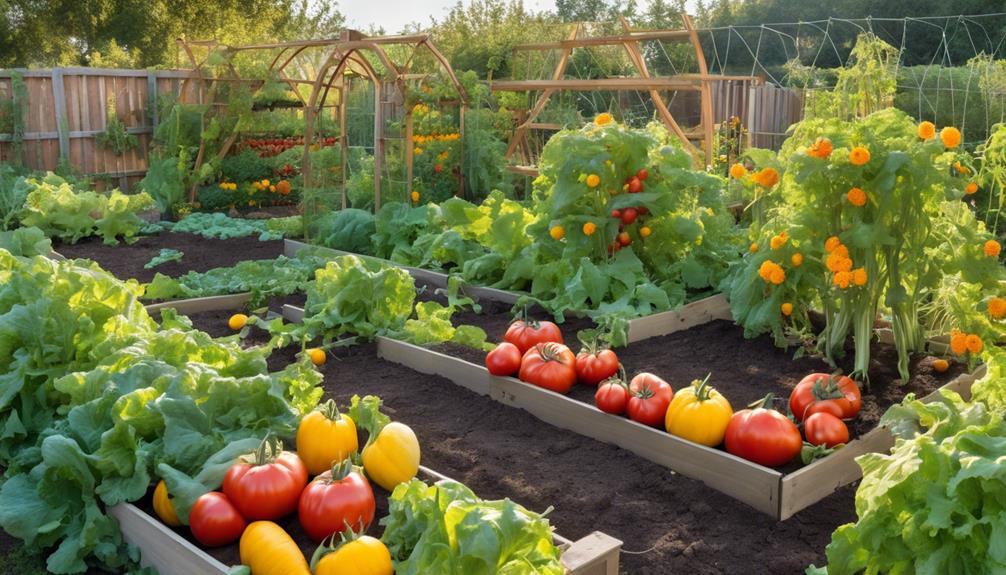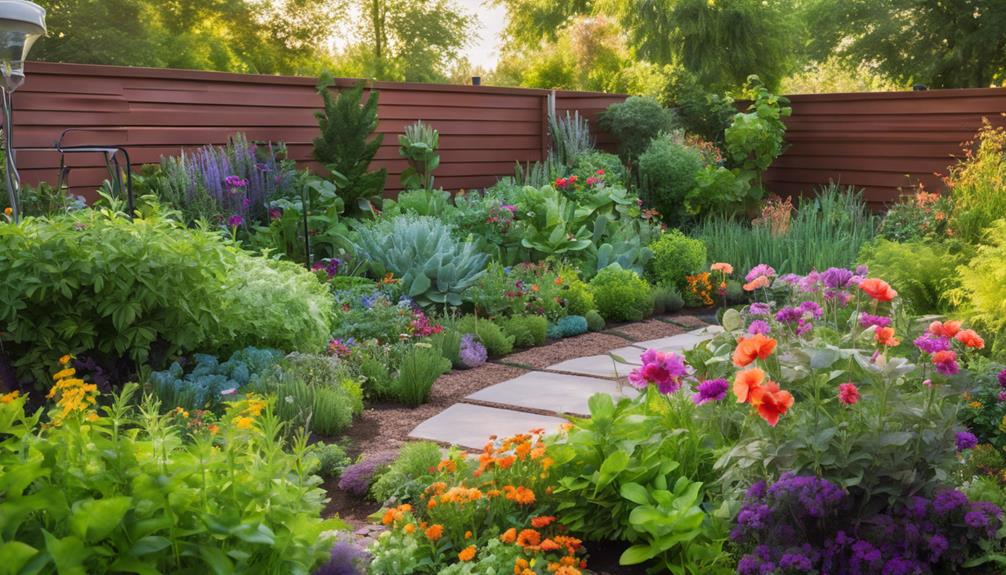
What Are Effective Year-Round Garden Maintenance Strategies?
30 September 2024
Top Reasons to Hire Professional Garden Maintenance
1 October 2024Urban gardeners require maintenance tips to cultivate thriving plants in limited spaces. Proper care ensures healthy soil, effective pest management, and ideal watering techniques tailored to diverse plant species.
Regular inspections help to catch early signs of pests or diseases, while crop rotation promotes soil health and sustainable yields. Furthermore, understanding soil quality and implementing appropriate gardening practices enhance productivity.
These tips not only support plant vigour but also improve resource use in urban settings. For those seeking to enhance their gardening efforts, additional insights are available that can elevate your urban gardening experience.
Urban Gardening Maintenance Essentials
Effective urban gardening requires a solid understanding of fundamental maintenance practices, particularly in watering techniques and pest control strategies.
Implementing a consistent watering schedule tailored to plant needs is critical for optimal growth.
Furthermore, proactive pest control measures are important to protect your garden from potential threats and ensure a thriving urban oasis.
Watering Techniques and Schedule
Proper watering techniques and schedules are vital for the success of urban gardening. Understanding the needs of your plants is significant; different species require varying amounts of water.
It is advisable to water deeply but infrequently, encouraging deeper root growth and improving drought resistance. Early morning is the best time for watering, minimising evaporation and allowing foliage to dry before evening, thereby reducing the risk of disease.
Employing drip irrigation or soaker hoses can deliver water directly to the soil, enhancing efficiency. Utilising mulch can help retain moisture and regulate soil temperature.
Monitoring soil moisture levels with a moisture meter can further refine your approach, ensuring that you provide the right amount at the right time, ultimately leading to a thriving urban garden.
Pest Control Strategies
Urban gardens, with their vibrant array of plants, can attract a variety of pests that threaten the health and productivity of your plants.
Employing effective pest control strategies is vital for maintaining a thriving urban garden. Start with preventive measures such as crop rotation, interplanting, and the use of companion plants, which can naturally deter harmful insects.
Regular monitoring is fundamental; inspect plants consistently for signs of infestations. If pests are detected, consider organic solutions like neem oil or insecticidal soap, which target pests while preserving beneficial insects.
Furthermore, incorporating physical barriers, such as row covers or traps, can provide immediate protection.
Ultimately, a proactive approach will guarantee the sustainability and productivity of your urban gardening endeavours.
Soil Quality and Composition
Soil quality and composition are crucial to successful urban gardening, influencing plant health and yield.
Incorporating organic matter enhances nutrient availability and improves water retention, while effective pest management techniques help maintain soil integrity.
Understanding these elements is vital for cultivating a thriving urban garden.
Organic Matter Content
A rich organic matter content is essential for maintaining healthy garden soil, as it directly influences nutrient availability, moisture retention, and general microbial activity.
To optimise organic matter in urban gardens, consider the following strategies:
- Composting: Regularly add kitchen scraps and garden waste to create nutrient-dense compost.
- Mulching: Use organic materials such as straw or wood chips to improve soil structure and suppress weeds.
- Cover Crops: Plant legumes or other cover crops during off-seasons to naturally enrich the soil with nitrogen and organic matter.
- Soil Amendments: Incorporate well-rotted manure or biochar to increase the organic content and improve microbial communities.
Implementing these techniques will greatly enhance soil quality, supporting robust plant health and productivity in urban gardening.
Water Retention Strategies
Effective water retention is vital for sustaining plant health in urban gardens, particularly in environments where soil quality may be compromised.
Implementing effective strategies can notably improve moisture availability and overall plant vigour. Here are four key approaches:
- Organic Matter Incorporation: Adding compost or well-rotted manure improves soil structure and enhances its ability to retain moisture.
- Mulching: Applying a layer of organic mulch conserves moisture by reducing evaporation and regulating soil temperature.
- Soil Amendments: Utilise water-retentive materials, such as coconut coir or hydrogels, to elevate the soil's moisture-holding capacity.
- Proper Irrigation Techniques: Employing drip irrigation or soaker hoses ensures consistent moisture delivery directly to the root zone, minimising water loss.
Adopting these strategies will lead to healthier, more resilient urban gardens.
Pest Management Techniques
How can urban gardeners effectively manage pests while maintaining ideal soil quality and composition? Successful pest management hinges on a balanced approach that integrates soil health with pest control strategies.
Here are four techniques to consider:
- Encourage Beneficial Insects: Introduce predatory insects such as ladybirds and lacewings to naturally control pest populations.
- Implement Crop Rotation: Varying crops each season disrupts pest life cycles and helps prevent infestations.
- Use Organic Amendments: Incorporate compost and organic fertilisers to enhance soil health, which in turn improves plant resilience against pests.
- Practice Integrated Pest Management (IPM): Monitor pest levels and combine biological, cultural, and mechanical methods to minimise chemical interventions.
Practical Gardening Techniques
Effective urban gardening begins with a thorough initial site assessment to understand the unique conditions of your space.
Implementing techniques such as mulching can greatly improve moisture retention, while companion planting strategies can promote healthier plant growth and pest management.
Together, these practical approaches form the foundation for a thriving urban garden.
Initial Site Assessment
A thorough initial site assessment is crucial for the success of any urban gardening project. This foundational step ensures that you understand the specific conditions of your environment, enabling informed decisions that will enhance plant growth and overall productivity.
Consider the following key factors during your assessment:
- Sunlight Exposure: Evaluate the amount of direct sunlight your site receives throughout the day.
- Soil Quality: Test the soil for pH, nutrient levels, and drainage capabilities to understand its suitability for planting.
- Water Accessibility: Determine the proximity to water sources and the potential for irrigation systems.
- Microclimates: Identify any variations in temperature and wind exposure that may affect plant selection and placement.
Mulching for Moisture Retention
After evaluating the site and understanding the environmental conditions, implementing effective mulching techniques can greatly enhance moisture retention in your urban garden.
Mulching not only conserves water but also improves soil quality and suppresses weeds. To master this technique, consider the following guidelines:
- Choose the Right Material: Use organic mulches such as straw, wood chips, or grass clippings for optimal moisture retention.
- Apply Adequately: Ensure a layer of 5-10 centimetres of mulch, allowing water to penetrate while reducing evaporation.
- Maintain Consistency: Replenish the mulch as it decomposes to maintain its effectiveness throughout the growing season.
- Avoid Soil Contact: Keep the mulch a few centimetres away from plant stems to prevent rot and encourage healthy growth.
Companion Planting Strategies
Companion planting can significantly enhance the health and productivity of your urban garden by strategically pairing plants that support one another.
Implementing these strategies can promote growth, deter pests, and optimise space.
Consider the following effective combinations:
- Tomatoes and Basil: Basil enhances the flavour of tomatoes while repelling pests such as aphids and hornworms.
- Carrots and Onions: Onions deter carrot flies, whilst carrots can help aerate the soil for onions.
- Marigolds and Cucumbers: Marigolds repel cucumber beetles and nematodes, fostering healthier cucumber plants.
- Beans and Corn: Beans fix nitrogen in the soil, benefiting corn, whilst corn provides essential support for climbing beans.
Enhanced Crop Yield Potential
While urban gardening often presents unique challenges, maximising crop yield potential is achievable through strategic planning and effective maintenance practices. Key factors such as soil quality, appropriate plant selection, and timely irrigation are essential for enhancing productivity. Implementing techniques such as vertical gardening and intercropping can greatly optimise space and resources.
| Factor | Best Practice | Impact on Yield |
|---|---|---|
| Soil Quality | Regular testing and amendment | Improved nutrient uptake |
| Plant Selection | Choose high-yield varieties | Increased harvest size |
| Irrigation | Drip systems for efficiency | Reduced water waste |
Ultimately, a meticulous approach to these elements can lead to considerable increases in crop yield, ensuring that urban gardeners can reap the full benefits of their efforts.
Pest Control Service Options
Effective pest management is essential for maintaining a thriving urban garden.
Among the diverse service options, natural insect repellent sprays, neem oil treatments, and beneficial nematode applications stand out as environmentally friendly solutions.
Each method offers unique advantages in controlling pests while minimising harm to beneficial organisms and the surrounding ecosystem.
Natural Insect Repellent Spray
Urban gardeners often seek sustainable methods to protect their plants from pests, and natural insect repellent sprays provide an excellent solution.
Utilising such sprays not only safeguards your crops but also aligns with eco-friendly practices.
Here are four effective ingredients commonly used in natural insect repellent sprays:
- Neem Oil – Derived from the neem tree, it disrupts pest reproductive cycles.
- Garlic – Its strong scent deters a variety of insects while being safe for plants.
- Peppermint Oil – Acts as a powerful repellent due to its invigorating aroma that pests find unappealing.
- Diatomaceous Earth – A natural powder that damages the exoskeletons of insects, effectively reducing their populations.
Incorporating these ingredients can improve the health of your urban garden while minimising chemical use.
Neem Oil Treatment
Many urban gardeners are increasingly turning to neem oil as a viable pest control option due to its natural origins and effectiveness.
Derived from the seeds of the neem tree, this organic solution offers a range of benefits for urban gardens.
To optimise its efficacy, consider the following tips:
- Dilution: Always dilute neem oil with water and a mild soap before application to improve absorption.
- Timing: Apply neem oil during the cooler parts of the day to prevent leaf burn and ensure ideal results.
- Frequency: Treat affected plants every 7-14 days for continued protection against pests.
- Targeted Application: Focus on areas where pests are most prevalent, ensuring thorough coverage on both sides of leaves.
Implementing these strategies will empower urban gardeners in their pest management efforts.
Beneficial Nematode Treatment
Beneficial nematodes offer a powerful biological control option for managing soil-dwelling pests in gardens.
These microscopic organisms target harmful insects without affecting beneficial species, making them an ideal choice for urban gardeners seeking sustainable pest management solutions.
To effectively implement beneficial nematodes in your garden, consider the following steps:
- Identify Pests: Determine the specific soil-dwelling pests affecting your garden to select the appropriate nematode species.
- Choose Application Method: Decide between dispersing nematodes in water or applying them directly to the soil.
- Monitor Soil Conditions: Verify that soil moisture and temperature are ideal for nematode survival and efficacy.
- Reapply as Needed: Regularly assess pest levels and reintroduce nematodes to maintain effective control.
Utilising beneficial nematodes improves garden health while promoting ecological balance.
Pest Infestation Remedies
To effectively combat pest infestations in urban gardens, it is crucial to implement preventive measures against fungal diseases, adjust soil pH appropriately, and utilise crop rotation strategies.
These approaches not only mitigate the risk of pests but also promote healthier plant growth and soil health.
Understanding the interplay between these methods can greatly improve the sustainability of your gardening efforts.
Fungal Disease Prevention Methods
Fungal diseases can pose significant threats to urban gardens, undermining plant health and reducing yields.
To safeguard your garden, implement the following prevention methods:
- Rotate Crops: Change the location of plant families each season to disrupt fungal life cycles.
- Improve Air Circulation: Space plants appropriately to allow airflow, reducing humidity around foliage where fungi thrive.
- Water Wisely: Water early in the day to allow leaves to dry before evening, minimising moisture retention that fosters fungal growth.
- Use Resistant Varieties: Select plants that are bred for disease resistance, enhancing garden resilience against fungal infections.
Soil Ph Adjustment Techniques
Achieving the ideal soil pH is crucial for maintaining healthy plants and preventing pest infestations in urban gardens.
Soil pH directly influences nutrient availability and microbial activity, which are vital for robust plant growth.
Here are effective techniques for soil pH adjustment:
- Lime Application: To raise soil pH, incorporate agricultural lime; this improves alkalinity and nutrient uptake.
- Sulphur Supplement: To lower soil pH, apply elemental sulphur; bacteria will oxidise it, converting it to sulphuric acid.
- Organic Matter: Regularly amend soil with compost; this can help buffer pH levels while enhancing soil structure.
- Testing Kits: Utilise soil pH testing kits to accurately monitor levels, guiding your amendment choices effectively.
Employing these techniques will create a thriving urban garden ecosystem.
Crop Rotation Benefits
Crop rotation is a fundamental practice in urban gardening that significantly reduces the risk of pest infestations. By systematically changing the types of crops planted in a specific area, gardeners can disrupt pest life cycles and minimise their impact.
The benefits of crop rotation include:
- Pest Management: Rotating crops confuses pests that thrive on specific plants, thereby reducing their populations.
- Soil Health: Different plants contribute varying nutrients, fostering a balanced soil ecosystem.
- Disease Reduction: Rotational planting helps break disease cycles that may persist in the soil.
- Biodiversity Promotion: A diverse crop environment encourages beneficial insects and pollinators, enhancing overall garden wellbeing.
Implementing crop rotation strategies not only safeguards your urban garden but also promotes sustainable gardening practices.
Why Choose TKL Birmingham Gardener
Choosing TKL Birmingham Gardener for your urban gardening needs guarantees a professional and dedicated approach to maintaining your green spaces.
Our team possesses extensive expertise in urban horticulture, ensuring the best care for diverse plant species within compact environments. We recognise the unique challenges urban gardens face, from soil quality to limited sunlight, and provide tailored solutions that promote healthy growth.
With a commitment to sustainability, we utilise eco-friendly practices that enhance biodiversity while minimising environmental impact.
Furthermore, our meticulous attention to detail ensures that every aspect of your garden is nurtured, from pruning to pest management.
Common Urban Gardening Questions
Urban gardening often raises a variety of questions, particularly for those new to cultivating plants in limited spaces. Common inquiries include ideal plant selection for specific light conditions, the most effective soil mixtures, and efficient watering techniques.
Furthermore, urban gardeners frequently seek guidance on pest management strategies that minimise chemical usage while ensuring plant health. Understanding how to optimise vertical space and utilise containers effectively is another prevalent concern.
Questions about seasonal planting schedules and crop rotation practices also arise, as these are essential for sustainable yields. Addressing these queries not only enhances the gardening experience but also fosters a deeper understanding of urban ecosystems, ultimately leading to more successful and rewarding gardening endeavours.
Final Maintenance Checklist
After addressing common inquiries related to urban gardening, it is vital to establish a systematic approach to maintaining your garden for optimal health and productivity.
A thorough final maintenance checklist is essential for successful urban gardening.
- Inspect plants regularly: Look for signs of pests or diseases to take prompt action.
- Water appropriately: Ensure consistent watering schedules, adjusting for seasonal changes.
- Prune and deadhead: Remove spent flowers and unhealthy growth to promote vigour and aesthetics.
- Fertilise judiciously: Apply organic fertilisers according to the specific needs of your plants, avoiding over-fertility.




